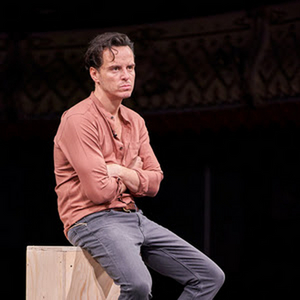Review Roundup: Andrew Scott in THREE KINGS as Part of Old Vic: In Camera - What Did the Critics Think?
The brand new play is by Stephen Beresford, and was created specifically for the series.

This weekend brought the Old Vic's streaming production of Three Kings, starring Andrew Scott, as part of Old Vic: In Camera.
The brand new play is by Stephen Beresford, and was created specifically for the series.
When Patrick is eight years old his absent father returns unexpectedly and in a brief but memorable encounter, sets him the challenge of 'The Three Kings'. Years later - recalling that meeting, and the revelations that followed - Patrick traces the events of his father's life - and takes us on a journey of grandiose plans, aching disappointments and audacious self delusion.
Let's see what the critics are saying...
Jesse Green, The New York Times: Yes, "Three Kings" uses film techniques - not just the split screens but cross-fades and edits - to help tell the story, but the story itself is conceived as no film would be, with no scenery, minimal music and one man playing all the roles. Scott's performance is likewise scaled not to the camera's small eye but to the huge empty space he's actually in. The roar of pain he lets loose near the end would tear a movie screen off its wall. So let's stop quibbling about or finessing the genre. Let plays be plays. But can we not take just one great thing from the movies: the chance to see them again? We are m
Eleni Cashell, BroadwayWorld: The direction by Matthew Warchus has clarity and purpose from the get-go and helps to elevate Scott's intense performance further. In particular, the camera dividing into multiple sections when two or more characters are in a scene is a simple touch which helps to set the scene quickly and effectively. Warchus's directorial choices further highlight their ability to adapt cleverly to limitations and still deliver something poignant.
Marianka Swain, The Arts Desk: Partly by necessity for this scratch performance, Matthew Warchus's direction is unfussy, but that suits the piece well. One major creative choice is very effective: a split screen, showing us Scott's performance from different angles. That helps us imagine the dialogues between several people, as well as giving us both his body language and an immersive close-up. It's riveting during key moments, like when Patrick's drunken father reveals he's remarried and had another boy, "the longed-for son and heir".
Catherine Love, The Guardian: Matthew Warchus's direction makes smart use of the subtleties of the live-streamed form. Scott's face is often framed in close-up, creating an intimacy that would be impossible if we were sitting in the Old Vic's auditorium. And as the play goes on, our view of him fragments into different shots, just as his performance suggests a man splintering into pieces. At the same time, while it's optimised for transmission via the Contemporary Stage of Zoom, there is something surprisingly old-fashioned about Beresford's play, with its careful structure and self-contained storytelling.
Dominic Cavendish, Telegraph: Though easy and colloquial the writing has the intensity of a Greek drama, suggesting how damage ricochets down generations. And in its rich mix of light and shade it's almost like a male correlative to Fleabag, winding towards an image of someone forsaken, kneeling and seeking absolution. The Old Vic's emptiness compounds the solitude - but Lord, we need it full again. This experiment asserts even through our laptop screens theatre's matchless ability to hold a mirror up to our complex natures.
Suzy Evans, LondonTheatre.Co.Uk: This paradox is not unlike the experience of seeing theatre virtually. We're at once closer to Scott, as Warchus's direction initially thrives in the closeup as Scott delivers much of the dialogue in direct address, making us, the viewer, feel as if we're in an intimate conversation on the other end. We can see Scott's every emotion, that even a front-row patron might not catch. We watch Scott's sweat and tears and how the minimal stage lighting illuminates his enunciating spit.
Clive Davis, The Times: He was every bit as mesmerising in Stephen Beresford's new 60-minute monologue, the latest work to be streamed live from the Old Vic (only five performances, sadly). Played out against the backdrop of an empty auditorium, the piece was sharp but relentlessly bleak, unfurling a son's reminiscences about an absent, unloving father who had always been a feckless chancer.
Catherine Love, The Guardian: Scott - for whom the script was written - is a transfixing presence on the screen. Shifting between Patrick at different stages of his life and his estranged, swaggering father, Scott's performance shows us the forces that ricochet down the generations, from little gestures that pass from father to son to the enduring pain of abandonment.
Reader Reviews

Videos

